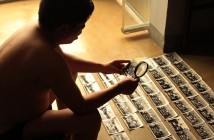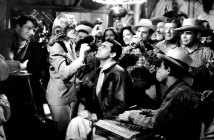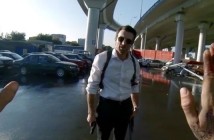
Editor’s Notes: The Kid, Speechless, & The Taviani Brothers Collection will be released on their respective formats on February 16th.
The Kid

The Kid (The Criterion Collection), released in 1921, was Charlie Chaplin’s first feature-length film. Chaplin had been making successful one- and two-reelers since 1914, and there were doubts that a comedy could sustain more than an hour. Chaplin wisely combined comedy and pathos.
An unmarried woman (Edna Purviance) abandons her newborn son in the back of a fancy car with a note pleading for the car’s wealthy owner to raise her socially doomed baby. But the car is stolen and the baby left on the street, where it is found by Chaplin’s happy-go-lucky tramp. The tramp rescues the baby, names him John and, five years later, has made the boy his partner in crime. John (Jackie Coogan) breaks windows that Chaplin’s glass repairman is soon hired to replace. The boy’s mother, meanwhile, has become a successful actress and is eager to locate and claim him as her own.
Chaplin found Coogan working in vaudeville. Four years old during the making of The Kid, Coogan displayed amazing natural talent and the ability to pull strongly at viewers’ heartstrings. The chemistry between Chaplin and Coogan is apparent in every scene, with both actors responding naturally and instinctively to one another. Years later, Coogan would play Uncle Fester on TV’s The Addams Family.
The Kid showed the world that Chaplin was a serious filmmaker as well as an international comedy star. He starred in and directed the movie, becoming an auteur long before the word became fashionable. The digital restoration of Chaplin’s 1972 release version features an original score by Chaplin.
Bonus extras on the Blu-ray release include new audio commentary by Chaplin historian Charles Maland; the video essay “Jackie Coogan: The First Child Star;” interviews with Coogan and actress Lita Grey Chaplin; excerpted audio interviews with cinematographer Rolle Totheroh and film distributor Mo Rothman; deleted scenes; footage of Chaplin conducting his score for The Kid; Nice and Friendly, a 1922 short featuring Chaplin and Coogan; and a critical essay.
Speechless

Speechless (Olive Films) stars Geena Davis and Michael Keaton as Julia Mann and Kevin Vallick, a pair of speechwriters for opposing New Mexico senatorial candidates. Julia is her candidate’s long-time speechwriter, who helps him get to the finish line of his latest campaign while camped out in a hotel preparing for a debate. Kevin is new to speechwriting. Formerly a writer on a TV sitcom, Kevin has been lured into the political battle to help the opposing candidate. Both Julia and Kevin are insomniacs and meet in an all-night convenience store, where they share the last bottle of Nytol. They’re attracted to each other but lie about their professions.
Reminiscent of the smart repartee of a Cary Grant-Katharine Hepburn screwball comedy, Speechless came out shortly after real-life political speechwriters James Carville and Mary Matalin got together while working on the 1992 presidential election. The film works because of the great chemistry between Davis and Keaton. They achieve a naturalness and sincerity that make their characters and their romantic interest believable. The movie defies expectations by having Julia and Kevin almost instantly fall for each other, rather than go through the usual, cliched scenes as antagonists gradually realizing they love each other.
A major drawback is that director Ron Underwood downplays the campaign in favor of the romantic slant. The importance of the election is not stressed adequately or given enough screen time, which doesn’t allow the main characters’ intelligence and ability to shine. Julia and Kevin are smart people. There should have more of them guiding their respective campaigns.
There are no bonus features on the Blu-ray release.
The Taviani Brothers Collection

The Taviani Brothers Collection (Cohen Media Group) contains three feature films directed by Paolo and Vittorio Taviani, Italian brothers who have been honored with numerous critical and industry prizes as well as top awards at Cannes, Berlin, and other film festivals. These films were all released theatrically in the United States.
The Night of the Shooting Stars (1982) takes place on August 10, the Night of San Lorenzo, the night of the shooting stars, when dreams come true. A woman tells her child about a similar night in 1944, when she was six years old and the residents of her small Tuscan town defied their Nazi occupiers. This film was one of the highest-grossing Italian-language films in U.S. history and a multiple award winner at Cannes.
Kaos (1984) tells five tales adapted from short stories by the Italian playwright Luigi Pirandello. In The Other Son, set in 19th-century Sicily, a woman waits for word from two sons who have emigrated to America but ignores the son still at home. Moon Sickness tells of a young newlywed who feels the strange effects of the full moon. In The Jar, a craftsman hired by a feudal landowner to repair a giant olive jar gets stuck inside it, and in Requiem, villagers struggle to bury their dead. An epilogue has Pirandello himself (Omero Antonutti) chatting with his mother about a story he’d like to write.
Padre Padrone (1993) focuses on the Benedetti family, haunted by a curse for generations. On a long drive to visit their grandfather, Luigi Benedetti tells his children the mysterious story of his ancestors, a tale filled with forbidden love, passion, and romance. A young woman, Fiorile (Galatea Ranzi) learns that her own brother (Claudio Bigagli) is guilty of the crime for which her lover (Michael Vartan of TV’s Alias) was executed and places a curse on her brother’s descendants. The drama unfolds as the 200-year-old curse comes to life.
All three films are in Italian, with English subtitles, and are presented in widescreen with Dolby Digital sound. There are no bonus features on the Blu-ray release.



